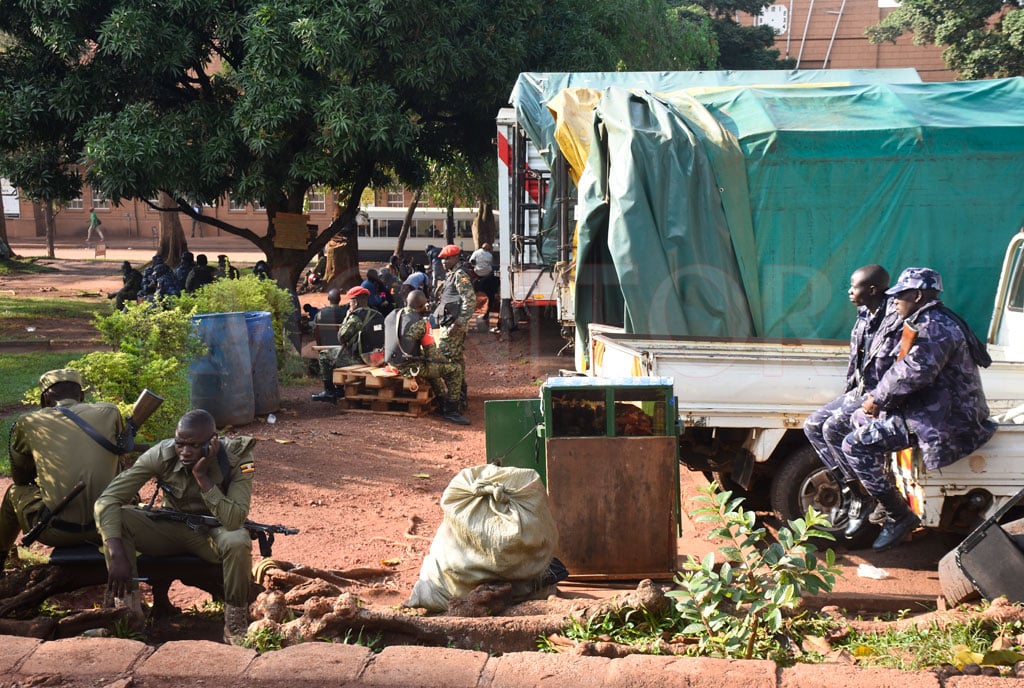Protests: Traders count losses as security maintains deployment

Kampala, Uganda, during July 23 March to Parliament anti-graft protests. Photo | Abubaker Lubowa
What you need to know:
- Movement restrictions on roads leading to Parliament have disrupted businesses, causing significant losses. National identification card checks for individuals accessing these roads and the vicinity of Parliament have further decreased customer turnout for nearby businesses.
The leadership of Kampala City traders has expressed concerns that the heightened security deployment following anti-graft protests has scared away potential customers, rendering many traders idle.
Movement restrictions on roads leading to Parliament have disrupted businesses, causing significant losses. National identification card checks for individuals accessing these roads and the vicinity of Parliament have further decreased customer turnout for nearby businesses.
Mr Thaddeus Musoke Nagenda, the chairperson of the Kampala City Traders Association (Kacita), said in an interview yesterday that some clients, particularly foreigners, are staying home due to the prevailing situation in the city.
“Some traders, especially those downtown, are working, but customers are scarce. Many are observing the situation from home because they fear chaos. A few shops along Kampala Road, mainly owned by foreigners, are closed and counting losses,” he said.
On Tuesday, security personnel clashed with youthful demonstrators who attempted to marched to Parliament in an anti-graft demonstration. More than 50 protesters were arrested and taken to different city courts before being remanded to Luzira prison.
Mr Nagenda noted that traders usually incur substantial losses during protests, prompting some to stay home until the situation normalises. He urged the government to engage in dialogue with the protesters and address their concerns amicably.
“We are requesting the government and other parties to get involved in dialogue. The young people who were arrested should be released and engaged in discussions,” he advised.
Mr Nagenda also emphasised the need for the government to commit to fighting corruption, stating: “No one can support corruption when people are overtaxed to raise money that is being stolen.”
He disclosed that city traders will meet with President Museveni on July 31 to discuss the contentious Electronic Receipting and Invoicing System (EFRIS) taxation model, with corruption being among the key issues to be addressed.
Mr John Paul Kayizzi, a taxi driver operating near Uganda House on Jinja Road, acknowledged that the clashes between protesters and security forces have brought business to a standstill.
“I usually transport traders from Mbale who come to shop in Kampala. I didn’t get any yesterday. They didn’t come because of what is happening. The situation is still bad,” he said while waiting for passengers to Mbale.
Ms Rose Mukisa, a mobile money operator, reported a significant decline in business. “I hardly made money yesterday because we spent most of the day running up and down. ..Today, customers are still scarce due to the presence of security personnel and the fear that protests might resume,” she said.
The usually busy roads leading to Parliament, such as Kimathi Avenue, Parliament Avenue, and Said Bare, have become noticeably quieter due to the restrictions imposed for the past two days.
Security personnel have set up barricades and are diverting cars, allowing only a few through. Pedestrians must present identification and state their destination before proceeding. These restrictions, which began on Monday, have negatively affected businesses in the area.
Ms Janet Agwang, who sells stationery and offers photocopying services on Kimathi Avenue, reported a drastic drop in customers.
“We are usually busy with different people needing various services, but now we don’t have any customers,” she said.
Mr Ismael Luyombya, a boda boda cyclist, said: “Those of us with stages are affected because we cannot go to someone else’s stage. Yesterday, I had only one customer the whole day, but now it’s about 1 pm, and I’ve transported at least four people,” he said.
Business owners report that most people are avoiding the area due to the restrictions and ID checks. The heavy security presence has also deterred many.
“Some ask for national IDs, and some of us don’t have them. It’s affecting us. They ask a lot of questions about where we are going and coming from,” one vendor said.
Ms Halima Nanfuka, a fruit vendor on Parliamentary Avenue, said: “I didn’t come to the city yesterday because my place of work was the centre of the protests. Today, I arrived around midday and haven’t sold any fruits yet. I have to feed my family. The presence of soldiers and police officers still scares away customers.”
Nalongo Teopista, a newspaper vendor near the main gate of Parliament, said: “I didn’t sell any copies yesterday because all the routes leading to Parliament were closed and guarded by security officers. Some roads still have restricted access. You have to present your ID to security before being allowed to walk towards Parliament. People are avoiding this area, making it hard to get customers.”
It remains unclear how long these restrictions and the security deployment will last.





